Principal investigator
Craig Packer, packer@umn.edu
Craig Packer was born in Texas and received his undergraduate degree from Stanford University in 1972. While still at Stanford, Packer went to Tanzania to study baboons with Jane Goodall at the Gombe Stream Research Centre. He then went to the University of Sussex to complete his Ph.D. research on the Gombe baboons. After a study of Japanese macaques in Hakusan National Park, Packer returned to Tanzania in 1978 to head the Serengeti lion project. He subsequently held a post-doctoral position at the University of Chicago and joined the faculty of the University of Minnesota in 1983, returning to the Serengeti for several months each year. Packer received a J.S. Guggenheim Fellowship in 1990, became a Distinguished McKnight University Professor in 1997, and was elected to the American Academy of Arts and Sciences in 2003. He is the author of “Into Africa,” which won the 1995 John Burroughs medal, and more than 100 scientific articles, most of which are about lions. His research has been supported primarily by grants from the National Science Foundation. more>>
Team members
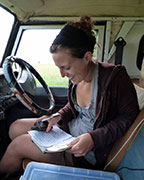
Meredith Palmer
Meredith utilizes a combination of experimental and empirical studies to examine predator-prey interactions, specifically looking at patterns of anti-predator behaviors in response to different predator hunting modalities and investigating how the behavioral trade-offs prey animals make play out across a gradient of time and space. Her research uses predator behavioral and demographic information from the Serengeti Lion Project and camera trapping data and citizen science support from Snapshot Serengeti. In addition to managing these two projects, she use these initiatives to develop educational tools for students and to increase scientific literacy by engaging members of the general public in the scientific process. You can read more about her work at meredithspalmer.wordpress.com.
Meredith earned her B.A. in Pre-Professional Zoology at Ohio Wesleyan University, conducting her honors thesis on the role of ultra-violet cues in fish mate choice. After graduating, she worked on a variety of field research projects in Central and South America, Africa, and the South Pacific, studying organisms ranging from invasive snakes to endangered felines.

Sarah Huebner
Sarah earned her undergraduate degree in ecology and evolution from the University of Northern Iowa, where she conducted research on prairie restorations and population genetics of pocket gophers. She currently studies the complex mechanisms by which megafauna such as lions and elephants interact with each other and their ecosystems, and how those mechanisms are modified by human activities. By elucidating the effects that keystone species assert on other organisms within their ecosystems, she hopes to shed some light on what will happen should the worst occur and these species go extinct. This knowledge will provide relevant management guidance to conservation officers and reserve managers charged with restoring degraded habitat and safeguarding populations of large mammals in the face of extensive habitat fragmentation and human consumption.
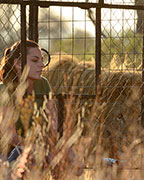
Natalia Borrego
Dr. Natalia Borrego earned her B.S. in wildlife ecology from the University of Florida, her M.Sc. in environmental science from Florida Gulf Coast University, and her Ph.D. in biology (focus on animal behavior and cognition) from University of Miami. She is currently a postdoctoral scholar at the University of Kwazulu-Natal, South Africa and a research associate at the Lion Research Center. She is interested in the evolution of sociality and cognition and bridging the gap between applied and theoretical behavior. She is setting up the KillerCam project to identify factors fostering decision-making and coordination during cooperative hunts in South African carnivores.
In addition to KillerCam, Natalia is continuing her projects using African carnivores as a comparative framework to experimentally investigate the evolutionary origins of cognitive complexity. To learn more about her research, visit her website.

John Heydinger
Trained as an historian and conservation biologist John’s research focuses on integrating social and
ecological factors in conservation. He is currently working in the communal conservancies of the Kunene Region of northwest Namibia, using a socially-oriented approach to examine the historical forces and livelihood factors driving human-wildlife conflict. His research takes place in partnership with Integrated Rural Development and Nature Conservation. You can learn more about his research at kuneneconservation.dash.umn.edu.
Current field assistants
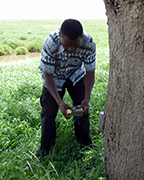
Norbert Isack
Norbert has been an invaluable part of the Snapshot Serengeti Project since 2013. Working out of Seronera, Norbert is the primary assistant in charge of maintaining camera traps and collecting image data from the field.
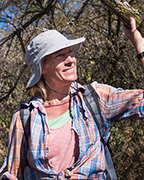
Ingela Janssen
Ingela received her master’s degree from Umeå University in 2005 and joined the Serengeti Lion Project in 2006—after bicycling through East Africa. Her master’s research was on bears; she returned to Sweden for 12 months in 2008 to resume her bear work before coming back to Tanzania to supervise the monitoring of Serengeti and Ngorongoro study populations. Ingela will be leaving Seronera in May 2010, but we look forward to working with her in other capacities in the future.
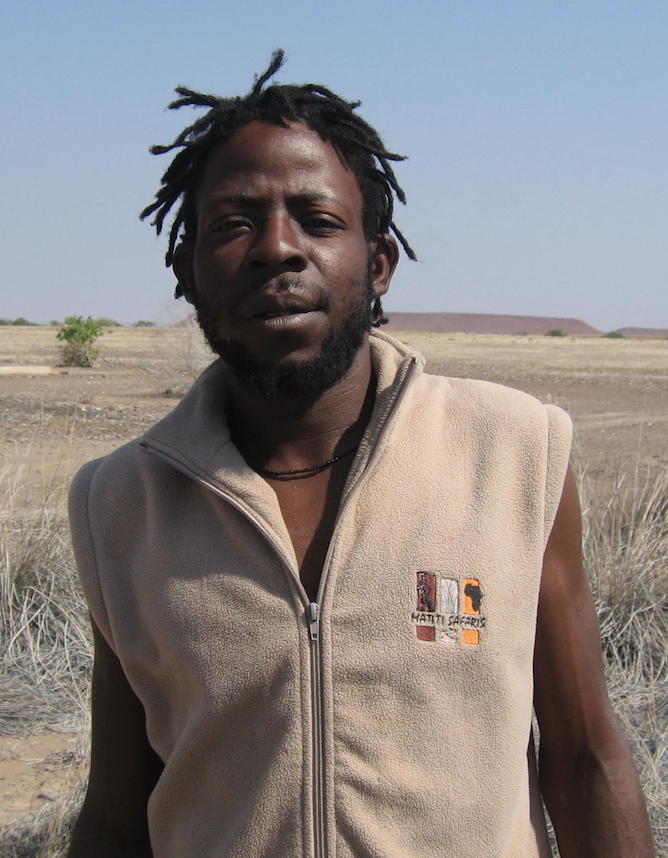
Jendery Tsaneb
Jendery is the lead field assistant and translator for the Kunene human-wildlife conflict project. A native Namibian and member of the Torra Conservancy, he has a deep knowledge of both livestock husbandry practices and the Kunene’s fauna and flora. Jendery works hard to maintain the project’s working relationships with local communities; he is our full-time eyes and ears on the ground in Kunene. Fluent in Damara, Otjiherero, Afrikaans, and English, Jendery’s language-skills and local knowledge are indispensable to our work.
Former graduate students + associates
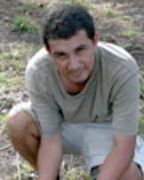
Henry Brink
Brink, who is Danish-Indonesian, grew up in Indonesia, Ethiopia, Tanzania and Sri Lanka. He has been a Ph.D. student since 2006 at the Durrell Institute of Conservation and Ecology (DICE), University of Kent, UK. His research focuses on assessing the lion population of Selous Game Reserve, Tanzania, and analyzing the impact of trophy hunting. Brink spent three years working on the Serengeti Lion Project. He also carried out biodiversity studies in the Udzungwa and Usambara mountains of Tanzania for two years and worked on the Kalahari Meerkat Project in South Africa for a year.
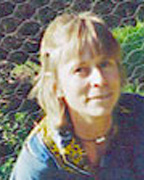
Monique Borgerhoff Mulder
Monique is a professor in the anthropology department at the University of California, Davis. She works on collaborative projects relating to life history, conservation and global patterns of cultural variation. Her research interests involve fieldwork in Tanzania, collaborations at the Santa Fe Institute, applied aspects of natural resource management, and the relationship of history and geography to culture. After working as a field assistant for the lion project in the 1980s, Monique was a co-founder of Savannas Forever and the Whole Village Project in 2006. Among her many projects in rural Tanzania, she studies human-lion conflict near Katavi National Park, focusing on the Lion Dance of Sukuma warriors.
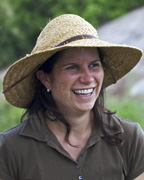
Meggan Craft
Meggan Craft received her Ph.D. from the University of Minnesota in 2008. Her research takes a multidisciplinary approach that uses methods from epidemiology, ecology, animal behavior and mathematics to investigate disease dynamics in animal populations. She combines empirical data from fieldwork with theoretical models to explore multi-host pathogen dynamics and persistence. She is broadly interested in questions such as: How are pathogens maintained in a multi-host ecosystem? How does social structure influence disease spread? Are there effective intervention strategies?
To learn more about Meggan’s research, visit The Boyd Orr Centre for Population and Ecosystem Health.
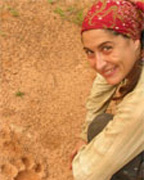
Emily Fitzherbert
Emily returned to Tanzania in 2009 following a four-year break taken for graduate studies, to conduct post-doctoral research with Prof. Monique Borgerhoff Mulder and Prof. Tim Caro at the University of California, Davis. She is now using anthropological methods to determine the cultural and economic drivers of lion hunting by the Sukuma, in western Tanzania. Having found that many Sukuma men are turning to the non-retaliatory hunting of lions in order to reap the rewards paid by their relatives, she is starting to explore the potential for self-regulation and economic disincentives to halt Sukuma lion hunting. An ecologist by training, her previous research has covered topics ranging from neotropical amphibian population dynamics, to multi-taxon assessments of the biodiversity value of multiple use landscapes in and around Katavi National Park. Her Ph.D. research, conducted as part of the ZSL Indonesia program (formally the Jambi Tiger Project), focused on the impacts of oil palm plantations expansion on mammalian diversity in Sumatra, Indonesia and the cost-efficiency of integrating set-side land into a commercial plantation.
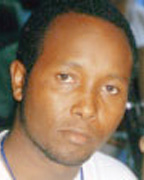
George Gwaltu
George graduated from the University of Dar es Salaam in 2009 and joined the Serengeti Lion Project the following November. He is currently based in Seronera and shares responsibilities for monitoring the Serengeti study population.

Dennis Ikanda
Dennis completed his master’s degree at the University of Dar es Salaam and earned a Ph.D. from the the Norwegian University of Science and Technology (NTNU). Originally from the Musoma district in the Mara region, he spent several years living in the United States while his father pursued a graduate degree. His master’s research centered on Maasai-lion conflict in the Ngorongoro Conservation Area, focusing on the relationship between cattle-killing by lions and retaliatory and ritual lion hunting by Maasai. Dennis spearheaded the first large-scale surveys of man-eating lions in Tanzania and his doctoral research focused on the behavior and ecology of man-eaters in southern Tanzania. He is now research director at the Kingupira Research Station in the Selous Game Reserve.
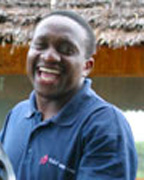
Bernard Kissui
Bernard completed his Ph.D. at the University of Minnesota in 2007, studying pride dynamics and population dynamics in the lions of Ngorongoro Crater and human-lion conflicts in Tarangire National Park. Bernard is from the Iramba district in the Singida region of Tanzania. He received his B.S. from the University of Dar es Salaam and completed his master’s thesis on the factors influencing lion population densities in the Ngorongoro Crater, also through the University of Dar es Salaam. Bernard’s doctoral research focused on Maasai-lion conflict around Tarangire National Park, and he is now a research scientist at the African Wildlife Foundation. He currently leads AWF’s lion conservation science project in the Maasai Steppe and is scaling-up effective conflict-mitigation strategies to protect as many Maasai as possible from future livestock losses.
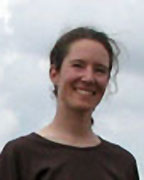
Margaret Kosmala
Margaret is an ecologist who earned her Ph.D. at the University of Minnesota and is now a researcher at Harvard University. She explores how plant and animal species and ecosystems change over time. In addition to Snapshot Serengeti, she is involved with Zooniverse projects Season Spotter and Jungle Rhythms.
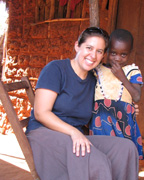
Hadas Kushnir
Hadas Kushnir received her Ph.D. in the Conservation Biology Program at the University of Minnesota, where she conducted research on human-lion conflict in southeastern Tanzania. Her interest in conservation biology and human-wildlife conflict arose during her undergraduate career at Barnard College, where she spent a semester in Kenya studying wildlife management. Before coming to the University of Minnesota, Hadas worked for the City of New York Parks and Recreation Natural Resources Group, where she planned and implemented community-based restoration projects. She is now working to implement recommendations from her dissertation research to help keep rural Tanzanians safer and prevent future lion attacks.
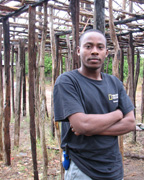
Harunnah Lyimo
Harunnah is a field researcher affiliated with the University of Minnesota conducting research on human-lion conflict in southeastern Tanzania. He has a bachelor’s degree in wildlife science and conservation from the University of Dar es Salaam, an advanced diploma from the College of African Wildlife Management, Mweka, and a postgraduate diploma from Oxford University. Previously, he worked for the German Technical Cooperation wildlife section where he helped facilitate community-based organizations and develop wildlife management areas surrounding Selous Game Reserve. He is currently working with Hadas Kushnir and is looking forward to pursuing his M.Sc./Ph.D. degree on implementing pragmatic measures to prevent human-lion conflict in Southern Tanzania.
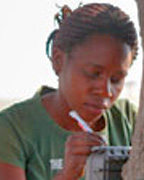
Candida Mwingira
Candida graduated from the College of African Wildlife Management, Mweka in 2008 and joined the Serengeti Lion Project in 2009. After monitoring the Serengeti lions for a year, she recently assumed responsibility for monitoring the lion population on the floor of the Ngorongoro Crater.
Stanslaus Mwampeta
Stanslaus is a University of Dar es salaam graduate, year 2010. Stanslaus joined the project in May of 2011, monitoring the basic demography and ecology of Serengeti lions. Stanslaus also assisted with the collection of camera-trap imagery.

Daniel Rosengren
Daniel earned his master's degree from the University of Umeå in 2001 after studying the population dynamics of voles in northernmost Norway. Then, in 2001, he went to the Peruvian Amazon, working for a study of the Short-eared Dog at the Cocha Cashu research station for Duke University. In February 2004 he started a cycling trip from the North Cape of Europe to the southernmost point of Africa, a 31,273 kilometer (19,436 miles) trip that took two years and crossed 26 coutries. Later he also cycled from Tierra del Fuego in southern South America, passing through 8 countries and crossed the Andean mountains 7 times up to Ecuador. After a year and a half on that trip he was asked to join the Serengeti Lion Project where he now has been working as a research assistant since 2010.
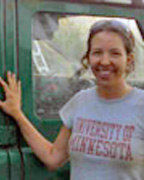
Megan Strauss
Born in Cape Town, South Africa, Megan Straus received a B.S. in anthropology-zoology and psychology from the University of Michigan, where she conducted her honors thesis on male-female interactions in captive chimpanzees. After completing her undergraduate degree, Megan worked on a prairie dog conservation effort in southwest Utah and as a research assistant at the University of Washington. She is currently a Ph.D. candidate at the University of Minnesota in the Department of Ecology, Evolution and Behavior. Her research focuses on the ecology, behavior and conservation of giraffes (twiga) in Serengeti National Park. An adjunct member of the Serengeti Lion Project, she is particularly interested in lion-giraffe interactions. For more information about Megan’s research please visit the Serengeti Giraffe Project.
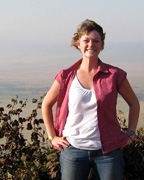
Ali Swanson
Ali's PhD with the Lion Research Center explored mechanisms of carnivore coexistence -- specifically how hyenas, cheetahs, and wild dogs manage to live with lions given overlapping ecological requirements and intense aggressive interactions. To study how these different carnivores were sharing the landscape, she established what is now the Snapshot Serengeti camera trap survey -- 225 remote, automatic cameras taking pictures of wildlife day and night. Images are classified by volunteers on snapshotserengeti.org. Ali is now a post-doc with the Zooniverse citizen science platform at the University of Oxford.

Kimberly Vanderwall
Kim graduated from the University of Minnesota in 2007, with a bachelor’s degree in ecology, evolution and behavior. She completed her undergraduate honors thesis with the Lion Research Center, studying social and ecological stimuli of pride divisions. She is pursuing her research interests in behavioral ecology in the Ph.D. program at University of California, Davis.

Peyton West
Peyton received her Ph.D. in 2003 from the ecology program at the University of Minnesota after completing her field research in the Serengeti. She majored in English at Yale University and worked in publishing in San Francisco before returning to Yale to study microbiology. Her thesis research on the evolutionary significance of the lion’s mane was featured in several documentaries as well as a full-length article in National Geographic. She published her results in Science magazine, Animal Behavior and, for a more general audience, American Scientist. After working in the mammal department at the Bronx Zoo, she moved to Washington D.C. and joined the American Association for the Advancement of Science (AAAS), where she works on issues at the intersection of science, education and religion.
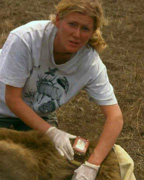
Karyl Whitman
After completing her field research in Tanzania, Karyl Whitman received her Ph.D. in ecology at the University of Minnesota in 2005. As an undergraduate, Karyl majored in anthropology at Rutgers University then lived in Kenya before moving to Minnesota. Karyl’s research on trophy hunting of African lions has been published in Nature and Conservation Biology and has led to important reforms in safari hunting practices in Botswana, Mozambique, Zimbabwe, Zambia and Tanzania. She has also published a guidebook to help hunters harvest lions more sustainably. She now lives in Seattle, Washington.